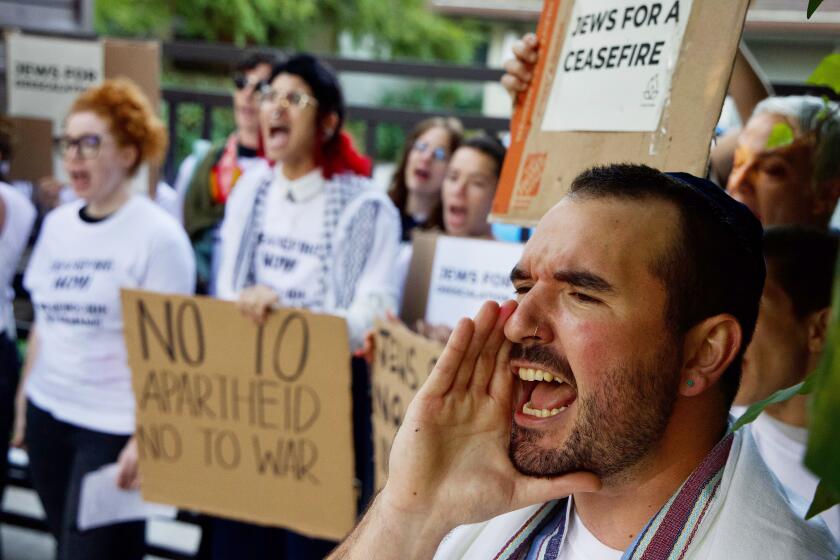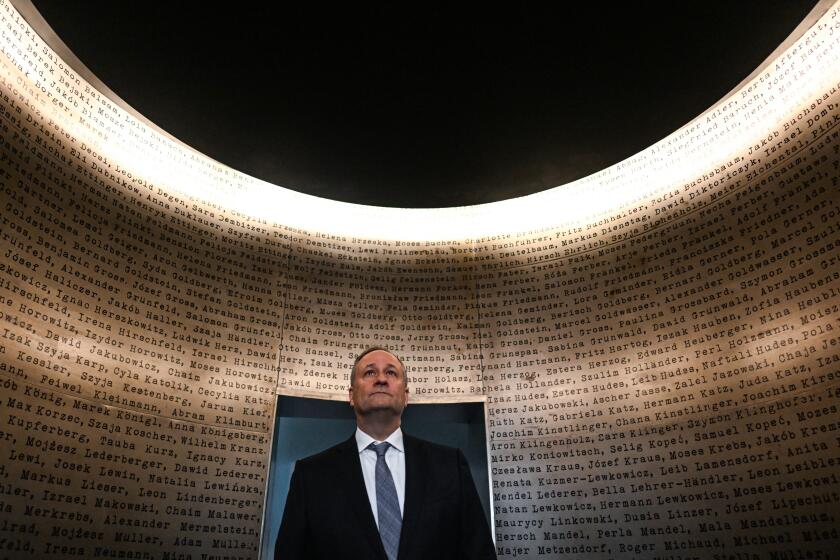‘And then I had to go out and speak’: Doug Emhoff on being Jewish right now

Doug Emhoff had a job to do, but first he had to gather himself.
Four days earlier, on the Jewish holiday of Simchat Torah, Hamas militants had launched a brutal surprise assault on Israel, killing more than 1,400 people. Vice President Kamala Harris and her boss, President Biden, had been fully briefed on the attacks the next morning, and she had called Israeli President Isaac Herzog to offer her condolences. Later that week, she told reporters she had been “completely outraged” by the “extreme acts of terrorism.”
But Emhoff, Harris’ husband and the first Jewish spouse of a president or vice president, had a special role to play, he said in an interview this week with The Times.
For more than a year, Emhoff had led the Biden administration’s efforts to fight antisemitism. The work was not always easy — last year, he represented the United States on a visit to Auschwitz-Birkenau — but never before had he been called upon to reassure Jewish Americans in the wake of hundreds of killings of their co-religionists.
After Hamas’ onslaught, the White House had hastily refashioned a previously scheduled roundtable Emhoff had planned to attend with Jewish leaders to be a more high-profile event. Biden would speak; national security advisor Jake Sullivan would be there. Emhoff — who, like most Jewish and Palestinian Americans, was dealing with what he called “very raw” feelings of his own — would have to attempt to comfort others.
As Biden and Emhoff waited to enter the room where they would address the Jewish leaders assembled for the roundtable, the president pulled the second gentleman aside, held his hands, and looked him in the eyes.
“How are you doing? How are you?” Biden asked Emhoff.
“It just got — it got me,” Emhoff recalled, his eyes misty. “And then I had to go out and speak. And so you saw my raw emotion.”
Protesters rallied outside Vice President Kamala Harris’ L.A. home as Israel continues its bombardment of the Gaza Strip following devastating Hamas attacks.
In his first public remarks since the Oct. 7 attacks, an emotional Emhoff spoke of his “deep, visceral connection to Israel and its people.”
“We witnessed a mass murder of innocent civilians. It was a terrorist assault,” he told the audience as he smashed his fist on the lectern he stood behind. Biden, with his hands in his pockets, stood next to Emhoff and listened.
“And there is never any justification for terrorism. There are no two sides to this issue,” Emhoff added.
During his speech, Biden remarked that he could “see the pain in some of your faces” as he walked into the room. He fixed his gaze on Sheila Katz, chief executive of the National Council of Jewish Women, who was crying. “You OK, kiddo?” he asked.
“Well, your fear for family, friends back in Israel. You worry about kids being targeted in school about — about going about their daily lives. You’re hurt by the downplaying of Hamas’ atrocities and blaming Israel. This is unconscionable,” Biden said.
Demonstrations over the Israel-Hamas conflict have roiled cities and college campuses. Different groups of protesters have gathered to express solidarity with Israel or Israelis, to support Palestinian civilians and to protest Israel’s military campaign.
But going so far as to express support for a group like Hamas is wrong, Emhoff told The Times.
“In my personal opinion, speaking out in favor of terrorism is wrong,” he said. “Hamas is a terrorist organization who committed terrorist atrocities to innocent people. And so that cannot be supported.”
When Vice President Kamala Harris’ husband saw a banner over the 405 — ‘Kanye is right about the Jews’ — he took it personally. Emhoff traveled to Europe to confront the fate his ancestors escaped.
In the days since the Oct. 7 attacks, Israel has laid siege to the Hamas-ruled Gaza Strip, launching a series of airstrikes and cutting off the territory’s access to water, power and basic supplies, a campaign that aid groups have warned is creating a humanitarian crisis. Israeli troops began preparing for a potential ground invasion of Gaza, where airstrikes have already killed around 3,500 Palestinians, according to the Gaza Health Ministry.
In the U.S., details of Hamas atrocities and graphic images of the bloodied scenes they left behind in southern Israel have flooded social media, television screens and newspapers. Overwhelmed hospitals and Palestinian bodies strewn across the rubble in Gaza after Israeli airstrikes have also played on loop.
The onslaught of horrible events and imagery have left some Jewish and Palestinian Americans despairing of any hope for peace in the region.
Grief has weighed on Emhoff over the last 10 days, too. “It’s just very raw for me as a Jew and as someone who has really put myself out there,” he said.
But hopelessness has not overwhelmed him. Biden and Harris have continued to push him to speak out against bigotry and violence “because it’s important,” he said. “Despite how painful this is ... the outrage and just the sheer pain and shock of what’s happening, I’m still going to keep doing what I’m doing — focus on fighting against hate and antisemitism and Islamophobia.”
Federal authorities have heightened security in cities across the country over fears that the war could lead to antisemitic or Islamophobic violence. On Saturday, a week after the Simchat Torah attacks, a Chicago man was arrested in the fatal stabbing of a 6-year-old Palestinian Muslim boy in what authorities have called a hate crime. Wadea Al-Fayoume was stabbed 26 times and his mother was wounded.
“It’s sick. I am sick about it,” Emhoff said of the killing.
To survive this moment, and ensure hate doesn’t further divide the country, Americans have to come together, Emhoff said.
“The most important thing is bringing groups together so we can fight against hate together,” he said. “No one can fight alone, which is something that [Harris] taught me. ... There’s nothing worse than feeling alone.”
More to Read
Get the L.A. Times Politics newsletter
Deeply reported insights into legislation, politics and policy from Sacramento, Washington and beyond. In your inbox three times per week.
You may occasionally receive promotional content from the Los Angeles Times.













